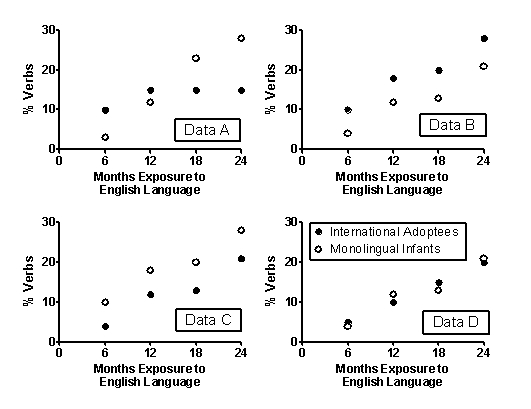Scenario I
Scenario I is based on and presents results consistent with the following studies:
Snedeker, J., Geren, J., & Shafto, C. L. (2012) . Disentangling the effects of cognitive development and linguistic expertise: A longitudinal study of the acquisition of English in internationally-adopted children. Cognitive Psychology, 65(1) , 39-76. doi:10.1016/j.cogpsych.2012.01.004
Snedeker, J., Geren, J., & Shafto, C. L. (2007) . Starting over: International adoption as a natural experiment in language development. Psychological Science, 18(1) , 79-87. doi:10.1111/j.1467-9280.2007.01852.x
Language development occurs in orderly stages, beginning with one-word utterances and progressing to two-word utterances, simple sentences containing function morphemes, and the emergence of grammatical rules. Psycholinguists have attempted to determine if language development is a consequence of cognitive development or if it reflects linguistic processes that occur independently of general cognitive development. Studies on the acquisition of a second language in internationally adopted children have provided insight into this research question. In a series of studies, Snedeker et al. (2007, 2012) studied the acquisition of the English language in adopted preschoolers from China. These children had no exposure to the English language before being adopted by families in the United States.
Figure 9.1 
-(Scenario I) Which is the BEST reason why the research question posed in Scenario I could not be answered by studying infants' acquisition of the English language and comparing it to infants' acquisition of the Spanish language in American-born bilingual homes?
Definitions:
Instrumental Conditioning
A learning process through which the strength of a behavior is modified by its consequences, such as rewards or punishments.
Operant Conditioning
A learning process where behavior is modified by consequences, such as rewards for positive behavior or punishments for negative behavior.
Constrain
A limitation or restriction on actions or outcomes.
Opportunity
A situation or condition that places an individual in a favorable position to achieve a desired outcome.
Q3: Which statement about the relationship between SES
Q11: Which of these is an example of
Q50: Robert Sternberg defined creative intelligence as the
Q74: Walking through the dense woods, observing the
Q83: In the three-level hierarchy of mental ability,
Q90: According to the facial feedback hypothesis:<br>A)emotional expressions
Q97: If we think of the brain as
Q117: People who are blind from birth show
Q119: A person who has suffered damage involving
Q132: Cross-cultural research on preliterate societies suggest that